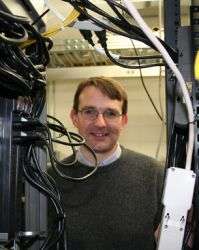Christmas delayed for physicists waiting for Large Hadron Collider

(PhysOrg.com) -- A University of Alberta researcher has learned that the Large Hadron Collider's experiments to duplicate the Big Bang and the origins of the universe will get going again in late July.
Roger Moore, of the U of A's Centre for Particle Physics and a member of the collider's science team based in Switzerland, received an internal report last week with the good news. Moore and three other U of A researchers involved with the collider have been on hold since the fall when a malfunction shut it down just before the collider was to send protons crashing together at near the speed of light. The repairs have been made but Moore says waiting for the day when the secrets of the universe could be revealed is frustrating.
"It's kind of like waiting for Christmas, only to wake up and find it's been postponed for six months," he said. But Moore knows the collider is a complicated device. "The problem is it's so big; it's a 27 kilometre-long circular tube." said Moore. "It's not like starting your car in the morning."
The original delay played havoc with Moore's schedule. He's trying to co-ordinate his university teaching duties with working visits to the collider. Moore and his U of A particle physics colleagues, Jim Pinfold, Doug Gingrich and Bryan Caron, were involved in the initial design of the collider and will help process reams of information that will come from the experiments. Moore is keen to get back to Switzerland. "We've all been responsible for various bits of the detector but what we really want now is to see some data," he said.
Right now Moore isn't sure if he'll be at the collider on the big day in July. "It depends when our shifts are scheduled; there's no set date like last time."
But Moore is keeping an eagle eye out for an announcement. "If it turns out there is a specific date then I'll do my best to be out there when it turns on." And Moore knows the rest of the U of A team wants to be in Switzerland too. For a physicist it's a once-in-a-lifetime opportunity.
For centuries scientists have been looking into the night sky and wondering how the universe was created. The hundreds of researchers involved with the Large Hadron Collider believe the universe started with a huge burst of energy. By crashing protons together, Moore is hoping to get as close as possible to recreating that moment. "We're trying to push back our understanding of the universe to less than a tenth of a millionth of a millionth of a second after the Big Bang," he said.
If Moore can't be there on the day the collider is fired up he'll still be close to the action without leaving the U of A campus. Moore will be supervising students who will collect information fed from the collider on a cluster of computers. "We would hope to analyze the data within a matter of hours from the actual proton collisions."
As July approaches one thing Moore isn't looking forward to is more talk about accidental black holes and the end of life on Earth. Some people believe the high-speed collision of subatomic material in the collider will trigger the entire planet to collapse in on itself. But Moore's assurances are ready.
"You won't see stars and planets disappearing from the sky," he said. "You can explain that until you're blue in the face but some people won't believe you."
If the Big Bang is successfully recreated, Moore hopes data from the experiment will cause existing particle physics theories to be re-examined. Moore looks forward to learning more about scientifically uncharted worlds like dark matter and the nature of mass because he says civilization needs discoveries on this scale to move forward.
"We started out thinking everything revolved around the Earth and then we learned no, we revolve around the sun," and that realization led to accepting the fact that even our galaxy is just one of millions. Moore says breaking new frontiers in physics is exciting but sobering. "Science at this level seems to make ourselves seem less and less significant in the universe."
Source: University of Alberta





















